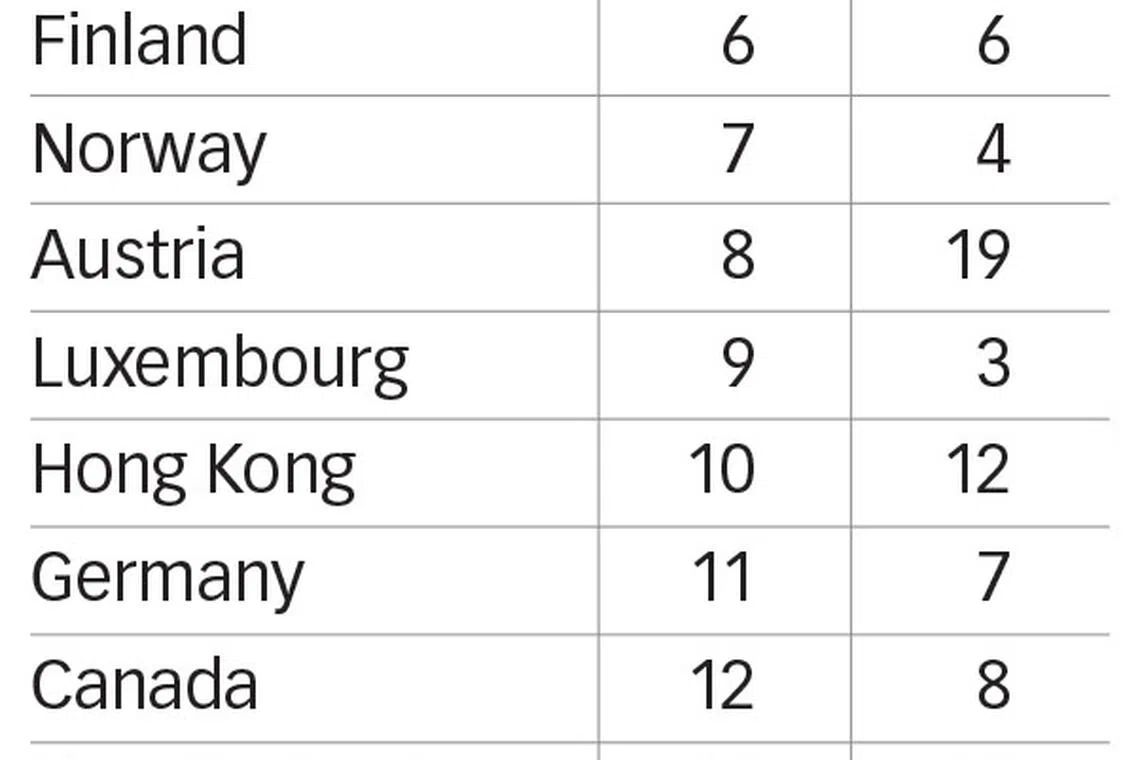Singapore losing edge in drawing and keeping talent: IMD report
Among 61 economies, Republic scores on attracting foreign talent, but lags in developing homegrown talent; high living costs also hurt its appeal
Singapore
SINGAPORE has slipped five places to 15th in the latest world-talent ranking by Swiss business school IMD.
Hong Kong was Asia's only representative among the top 10-ranked world economies in terms of how well they develop, attract and retain talent for the businesses operating in them. All Asian economies, including Taiwan, Japan, South Korea, China and India, lost ground in the 2016 talent league table.
The IMD World Talent Report 2016 is compiled by the same global learning institution which also puts out the annual World Competitiveness report.
Singapore, Asia's only top 10-ranked entry last year (at 10th position), was among those which took the hardest knock in this year's league; only South Korea and the Philippines among Asian economies slipped down more rungs.

Singapore's slide down the talent score board appears to reflect not how IMD sees it today, but tomorrow.
The IMD talent ranking is structured according to three factors - investment and development, appeal, and readiness. Among the 61 economies on the list, Singapore tops the "readiness" score. This means its current "availability of skills and competencies in the talent pool" is the best.
Under "readiness", Singapore is also first in "science in schools", second in "university education" and "educational assessment - PISA" and third in "educational system" and "student mobility inbound".
Like most of its Asian counterparts, it tumbled in the overall ranking because it fell behind in investing in and developing homegrown talent, said the report. It emerged only 38th in the sub-ranking for this.
Arturo Bris, the director of the IMD World Competitiveness Centre, said: "There's no doubt that many Asian economies, Singapore arguably chief among them, remain among the very best attractors of talent from abroad.
"There's no doubt, too, that they're able to improve their overall competitiveness as a result of the knowledge and experience this foreign talent brings - but this isn't enough to compensate for the lack of development of local talent, particularly with regard to the paucity of public-sector investment in education."
In an e-mail to The Business Times, he identified inadequate investment and development of its own talents as one of Singapore's biggest weaknesses. He noted that Singapore's spending on education declined from 3.08 per cent of its gross domestic product (GDP) last year to 2.99 per cent this year, which is lower than 55 of the economies in the IMD ranking.
Singapore also did badly in pupil-teacher ratio, ranking 41st for primary education and 35th for secondary education.
Professor Bris said Singapore may be losing its shine in drawing overseas talent also because of its higher cost of living: "Singapore, like Hong Kong, is incredibly expensive for expats to live in. The rising cost of living may potentially become a major concern for those working here or thinking of doing so."
Singapore's living cost is higher than 55 of the economies in the ranking and is clearly the main cause of its poor showing - ranked 19th - in "appeal" to foreign talent. Under "appeal", it also didn't do well in "effective personal income tax rate" (ranked 32nd), "worker motivation" (23rd) and "remuneration in services profession" (20th).
Still, there is some saving grace for the city-state, which was ranked third in terms of "appeal" for "foreign high-skilled people".
Prof Bris said the slip in this year's talent ranking will make it challenging for Singapore to identify, sustain and develop talents going forward, meaning it will lose some competitive edge.
"Talent competitiveness is a long-term driver of overall competitiveness - only countries that excel at developing the right people's capabilities build efficient economic systems," he said.
When the IMD talent ranking first appeared in 2007, Singapore was placed fourth. It jumped to second the following year. In 2011, it was 17th. It bounced back to ninth in 2012, but slipped back to 17th in 2013 and 16th in 2014.
Copyright SPH Media. All rights reserved.
